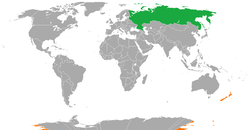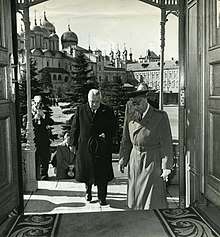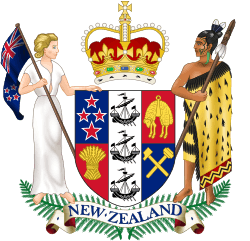New Zealand–Russia relations
New Zealand–Russia relations refers to bilateral foreign relations between New Zealand and the Russian Federation. New Zealand has an embassy in Moscow and an honorary consulate in Vladivostok. Russia has an embassy in Wellington. Both countries are members of APEC.
 | |
Russia |
New Zealand |
|---|---|
Foreign Affairs Minister Winston Peters wants to revive trade negotiations with Russia. Peters told reporters that New Zealand should be trading more with Russia, which was the world's number two dairy importer and was set to become the world's number two beef importer. In 2016, Russia imported $24.6 million worth of New Zealand red meat, the majority of it beef livers ($9.5m), chilled beef ($1.9m), beef hearts ($1.6m) and frozen beef ($1.4m).[1]
History of bilateral relations

Past relations with the Soviet Union and with imperial Russia were sometimes strained. In the nineteenth century the Russian Empire was seen as a threat to the British Empire, of which New Zealand was a loyal member. Coastal fortifications were constructed in the 1870s and 1880s because of the perceived threat, and an Auckland newspaper produced a sensation in 1873 by running a hoax story of an attack by a Russian warship called the Kaskowiski on Auckland and on a British ship in Auckland Harbour.[2][3]
.jpg)
In the twentieth century, Soviet politics was seen as subversive, with election cartoons showing sinister Bolshevik agents from the 1920s on. The influence of local left-wingers in trade unions was a theme of Robert Muldoon, the Prime Minister from 1975 to 1984. National won the 1975 election, helped by an (in)famous television advertisement of Dancing Cossacks and the implication that Labour's proposed Superannuation scheme would lead to state control. In 1980 New Zealand sent a small rump team to the 1980 Summer Olympics in Moscow, although the government persuaded most local sporting bodies to join the boycott in protest of the Soviet–Afghan War.
Muldoon avoided any interference with trading relations; Gerald Hensley recalls that in 1979 the Soviet ambassador to New Zealand (Sofinsky): "broke a prime rule of the diplomatic game and in the absence of his KGB man .... handed over a subsidy to the Soviet-aligned Socialist Unity Party .... and was caught by our security service" and so was to be expelled. But Hensley was sent to London to check, as: "New Zealand sold large quantities of mutton (which few others would buy) and butter to the state trading corporations in Moscow and the Prime Minister wanted to take further advice on the risks to our trade." The British Foreign Office view was that "if we expelled Sofinsky the Russians would expel our ambassador but there the matter would rest unless we wished to take it further. It would take stronger measures than this to lead Moscow to imperil its purchases of food."[4] Similarly an order for rolling stock (New Zealand EM class electric multiple unit) for the government-owned railways was placed with Hungary rather than Japan for balance-of-trade reasons. Additionally, Lada motor vehicles were widely distributed in New Zealand in the 1980s by the Dairy Board (now Fonterra).[5]
After the Soviet Union dissolved in 1991, bilateral trade between New Zealand and the re-established Russian Federation slumped dramatically, but picked up again later in the decade.[6]
In November 2010, New Zealand commenced negotiations to form finalize a free trade agreement with the Russian Federation, Belarus, and Kazakhstan. These negotiations were suspended as a result of the Russian annexation of Crimea and the Ukrainian crisis in 2014.[7] In early November 2017, it was reported that the New Zealand Foreign Minister Winston Peters would explore resuming trade negotiations with Russia. Peters is the leader of New Zealand First, a coalition partner in the Sixth Labour Government. Peters' proposal was criticized by European Union Ambassador Bernard Savage, who warned that the proposed free trade deal would complicate New Zealand–European Union relations. New Zealand Council of Trade Unions Director Bill Rosenberg also expressed concern about Russia's "poor" labour standards.[8][9][10]
Russian community in New Zealand: There are about eight thousand ethic Russians living in New Zealand. There was a bilingual Russian monthly (English and Russian newspaper) published from 1995 to 2002.
See also
- Foreign relations of New Zealand
- Foreign relations of Russia
- List of Ambassadors of New Zealand to Russia
- Category:Ambassadors of New Zealand to Russia
- Category:Ambassadors of Russia to New Zealand
- Pavlova
References
- "Winston Peters' plan to reopen trade talks with Russia called 'puzzling'". Stuff. Retrieved 2017-11-04.
- "War with Russia: a calamity for Auckland". Nelson Evening Mail. VIII (48): 4. 24 February 1873.
- "THE RUSSIAN ATTACK UPON AUCKLAND". Nelson Evening Mail. VIII (79): 4. 1 April 1873.
- Final Approaches: A Memoir by Gerald Hensley (2006, Auckland University Press) p.221 ISBN 1-86940-378-9
- New Zealand and the Soviet Union, 1950-1991: A Brittle Relationship, April 1, 2005. Retrieved June 22, 2010.
- Andrea Fox (2013-10-15). "Russia offered MiGs, tanks to settle NZ debt". Fairfax Media.
- "Russia – Belarus – Kazakhstan Customs Union FTA". Ministry of Foreign Affairs and Trade. Retrieved 7 November 2017.
- Nadkarni, Anuja (4 November 2017). "Recommended by Winston Peters' plan to reopen trade talks with Russia called 'puzzling'". Stuff.co.nz. Retrieved 7 November 2017.
- Nippert, Matt (7 November 2017). "Winston Peters' plans to reopen trade with Russia raises alarm from Europe". The New Zealand Herald. Retrieved 7 November 2017.
- "Peters' plan to trade with Russia slammed by EU". Otago Daily Times. New Zealand Media and Entertainment. 4 November 2017. Retrieved 7 November 2017.
- Sources
- New Zealand the Soviet Union and Change: the papers of the Twenty-Fourth Foreign Policy School 1989 edited by Ralph H. C. Hayburn (University of Otago, Dunedin, 1990) ISBN 0-908773-10-2
- New Zealand and the Soviet Union 1950-1991: A Brittle Relationship by A. C. Wilson (Victoria University Press, Wellington, 2004) ISBN 0-86473-476-X

